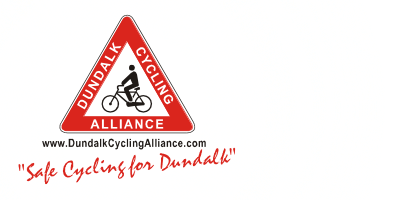Ireland has a transport problem, and so does Dundalk. There is traffic, congestion, a lack of road space for cyclists and more. More specifically we have a car problem. Our roads are considered their domain, with walkers and cyclists a secondary consideration, especially in the countryside. There is no denying, unless you live within walking distance of shops, your place of work, schools etc. we have engineered our way into car dependency. There are enormous health and societal costs accompanying this, most of which have been normalised. Let’s take a look;
- Ireland is only behind Cyprus as the most car-dependent country in Europe.
- 76% of people use a car as their main form of transport (even though most journeys are less than 2km).
- From 915,000 cars in 1985 to 2.9 million in 2021…we have lived through a car boom in a single generation, have we noticed the extra 2 million cars on the roads?
- The result is that in this same generation the number of children walking and cycling to primary school has dropped from 50% in 1986 to only 25% today.
- Concurrently rates of overweight and obesity rates in Ireland have more than doubled since 1990, with Ireland on track to top Europe by 2030.
- Only half of Irish adults meet the recommended 150 minutes of mild-to-moderate intensity exercise recommended.
- Our ageing population is seeing the burden of chronic disease burden continue to grow. Is there a better way?
All of the above changes have happened so incrementally, as the result of unfettered market forces, poor planning, and political inattention we might be likened to the frog in the slowly boiling water. We certainly didn’t intend for these changes to occur. At the same time, Ireland is legally obliged to decrease transport related emissions by 50% by 2030. More cars mean we not only move less, but also emit more greenhouse gases. Poor air quality not only increases respiratory diseases, such as asthma, but results in an estimated 2,600 premature deaths due to poor air quality.
This is where bikes and walking come in.
- Cycling and walking do not need fossil fuels to move.
- Cycling and walking improve our physical health.
- Cycling and walking improve our mental health.
- Cycling and walking help address poor air quality.
- Cycling and walking save the state money.
If distance is a barrier, e-bikes allow further travel, with less effort and all of the associated benefits of avoiding car travel. E-bikes can also be a more accessible option for less active members of the community.
Active travel is the only solution which targets both the climate and health emergencies Ireland faces.
